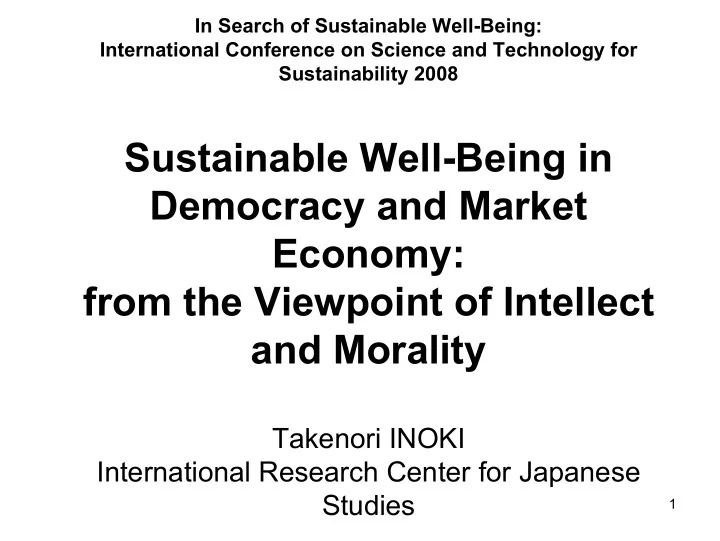

In Search of Sustainable Well-Being: International Conference on Science and Technology for Sustainability 2008 Sustainable Well-Being in Democracy and Market Economy: from the Viewpoint of Intellect and Morality Takenori INOKI International Research Center for Japanese Studies 1
• In order to discuss the meaning of sustainable well-being , we need to direct our attention anew to the concept of well-being (welfare) and to questions such as how are human feelings of happiness associated with intellect and moral values. • Our main concern here is the relationship between social system and our mentality with respect to the sustainability of our society. 2
1. Happiness and Economic Well-Being Are Not Directly Connected • In the advanced industrial nations of the postwar world, although GDP has increased quite rapidly, the degree of “happiness” has increased only a little (Oswald (1997)). • well-being is not a matter of income alone, but such things as health, marriage, work, and civic trust have much to do with it. • Moreover, there is research (Frey and Stutzer (2002)) that shows that political participation (e.g., the direct democratic politics of Switzerland) has a high positive correlation with “happiness.” 3
• One hypothesis is that happiness and well-being can coincide and be sustainable when human intellect and moral values are fully developed. Only when there is an intellectual understanding of the relationship between self and the environment, and only when moral values including virtues, both public and private, are fully maintained, can those feelings have true substance. 4
2. Roles of Intellect and Morals • Civilization (welfare or happiness) means not only comfort in daily necessities but also the refining of knowledge and the cultivation of virtue so as to elevate human life to a higher plane. (Fukuzawa (1875)) • a pair of binaries: private virtue, public virtue, private intellect, public intellect 5
2. Roles of Intellect and Morals • Public intellect is a capability to judge and choose which value is most important under certain circumstances. • Why clean airs rather than greater industrial output, Why longevity, or why stay alive without considering quality of life? Why do we put a higher value on one thing, and a lower value on another ? In order to answer these questions, we need to have public intellect . 6
Intellect Creates Long-Run View in Market and Democracy • 1) the possible influence upon our time- horizon. It may be called “long-run cost” of short-sighted thinking (lack of intellect) in fierce global competition. e.g. human resource development, R&D investment, movement of short-term capital • 2) Conflicts of Private and Public Interests • 3) role of voluntary associations 7
3. Market and Democracy Does Not Always Guarantee Sustainable Well-Being • The problem of democracy is how to recreate a sense of public morality on the basis of equality and individualism. Individual interest is not always compatible with the public good. 8
• several democratic expedients, which tend to transform private interest into public domain. 1) Roles of local self-governments: 2) Jury system 3) Freedom of association Through the operation of associations, individuals learn the art of adapting themselves to a common purpose. 9
Obligation to other people, obligation to future • 1) how to combat the materialist teaching • 2) how to withdraw men from their exclusive preoccupation with themselves • 3) men’s obligations to each other and to that greater whole 10
• Essential roles and raison d’êre of intermediate social associations or social bodies that counter the extreme expansion of private interests. • Since most of social institutional devices are basically designed to transform private interest compatible with the public good, or they tend to make individuals “rational” in the long-run. (Schelling 1984) 11
4. Concluding Remarks • What is important for a democratic state is a sufficient range of knowledge and information that would allow its people to make ethically good choices. In other words, intellectuality and information are indispensable to have firm ethics (morals) to appropriately and selectively deal with difficult problems. • Unless we expand our thinking to our future and other people, our economic and political system cannot be sustained due to the lack of intellect and morality. 12
Recommend
More recommend